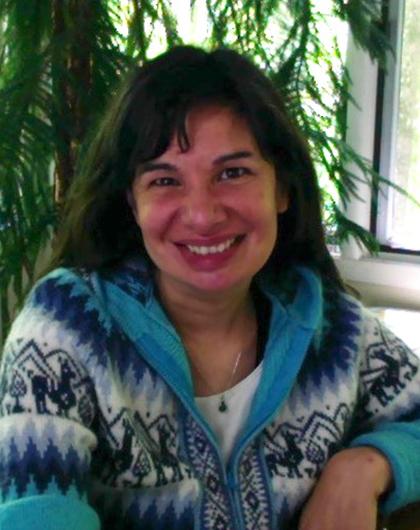Scholars
Sonya Margarethe Ahamed
School for International Training
Based in
United States
North America
Sonya Ahamed is a transdisciplinary scholar with two decades of experience in human-environment interactions, geospatial data analysis, and systems science. Her current research investigates the global oil and gas extraction network, global systemic carbon collusion, the climate impacts of food-energy-water (FEW) systems, and just system transitions. She is the Program Director for the IHP comparative study abroad program at the School for International Training in “Climate Change: The Politics of Land, Water, and Energy Justice,” which takes undergraduate students to San Francisco, Morocco, Nepal, and Ecuador each semester to study climate change from a global, place-based, and multidisciplinary perspective. She holds a doctorate in natural resources from the University of Vermont, where she was a PhD Fellow in the National Science Foundation (NSF) Integrative Graduate Education and Research Traineeship (IGERT) program “Smart Grid – Technology, Human Behavior, and Policy” and a visiting professional at the National Renewable Energy Laboratory in Colorado. As part of NSF’s Innovations at the Nexus of Food-Energy-Water Systems (INFEWS) initiative, her postdoctoral work with a multidisciplinary team of researchers investigated the impacts of COVID-19 on energy, water, and food consumption; tracking the carbon and water footprints of household consumption; and extending models of social practice theory, among other topics.

Country(ies) of Specialty
Canada United StatesFocus areas of expertise
Climate Justice Fossil fuels Renewable energyPublications
Articles
Ahamed S, Galford GL, Panikkar B., Rizzo D. Stephens JC. 2024. Carbon collusion: Cooperation, competition, and climate obstruction in the global oil and gas extraction network. Energy Policy. 190. 114103. https://doi.org/10.1016/j.enpol.2024.114103
Ahamed S, Schelly C, Floress K, Lytle W, Caggiano HB, Cuite C, Wallace C, Cook R, Jarvis R, Shwom R, Watkins D. 2023. ‘Being able to work has kept our life fairly constant:’ Reconciling social practice models to assess the impact of (infra)structural inequities on household wellbeing during the COVID-19 pandemic. Environmental Research: Infrastructure and Sustainability. https://doi.org/10.1088/2634-4505/acc272
Caggiano HB, Ahamed S, Lytle W, Schelly C, Floress K, Cuite C, Shwom R. 2023. Green roles at home: Exploring the impact of household social dynamics on consumption at the Food-Energy-Water (FEW) nexus. Journal of Environmental Studies and Sciences. https://doi.org/10.1007/s13412-023-00824-x
Daignault J, Watkins D, Wallace C, Handler R, Yang Y, Heaney D, Ahamed S. 2023. A household-scale life cycle assessment model for understanding the food-energy-water nexus. Frontiers in Environmental Science. https://doi.org/10.3389/fenvs.2023.1059301
Kumar P, Caggiano H, Cuite C, Andrews CJ, Felder FA, Shwom R, Floress K, Ahamed S, Schelly C. 2022. Behaving or not? Explaining energy conservation via identity, values, and awareness in suburban U.S. homes. Energy Research and Social Science. 92 102805 https://doi.org/10.1016/j.erss.2022.102805
Ahamed S, Sperling J, Galford GL, Stephens JC, Arent D. 2019. The food-energy-water nexus, regional sustainability, and hydraulic fracturing: An integrated assessment of the Denver Region in the United States. Case Studies in the Environment. https://doi.org/10.1525/cse.2018.001735.
Galford GL, Fernandez M, Roman J, Monasterolo I, Ahamed S, Fiske G, González P. 2018.
Cuban land use and conservation: Rainforests to reefs. Bulletin of Marine Sciences.
https://doi.org/10.5343/bms.2017.1026
Allen E, Stephens JC, Yorgey G, Kruger C, Ahamed S, Adam JC. 2017. Climate science information needs among Northwest US natural resource decision-makers. Climate Services. http://dx.doi.org/10.1016/j.cliser.2017.03.002


